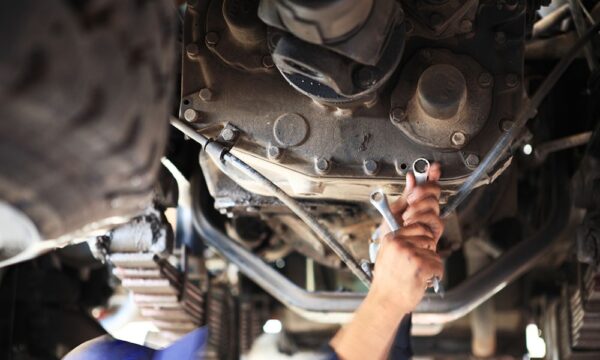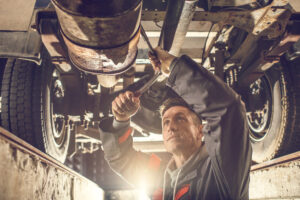
You’ve seen the stickers while driving down the highway. Affixed to the back door of a tractor-trailer truck, a reflective diamond reads in large print: “How’s My Driving?”
It’s a nice thought that professional truck drivers and their management companies would offer other motorists the chance to give feedback on their performance behind the wheel. But the fact is that even a truck driver who manages his rig in perfect compliance with the law may be in imminent danger of causing harm to himself and to other drivers.
That’s because driving isn’t the only factor that causes truck accidents. And while fatigue is often cited as a prevalent cause of truck-related highway accidents, statistics show that less than 2% of accidents are due to a driver falling asleep at the wheel.
In fact, a highly prevalent cause of truck accidents is one of the most overlooked: truck maintenance.

Common Causes of Truck Maintenance Accidents
The following maintenance issues are two of the most often found at fault in a truck maintenance accident:
Faulty Brakes
While data regarding truck maintenance as the cause of accident is notoriously hard to come by, it is known that at least five percent of all truck accidents are caused by faulty brakes.
When you consider that brakes are the one thing standing between a 25 to 50,000-pound vehicle plowing at high mileage into another vehicle or something on the side of the road, it is easy to understand the imperative nature of keeping brakes in unimpeachable condition.
Accordingly, the federal government sets very high standards for the maintenance of truck brakes. The responsibility for this maintenance does not fall to the truck driver alone. While a driver is legally required to inspect his vehicle each day to ensure it is in good working condition, the brake system of a big rig truck requires the attention of a maintenance specialist who can listen for telltale air leaks in the brake chamber, ensure that there are no broken or loose parts within the system, and perform other checks.
If a truck owner or management company is not willing to spend the time or money to schedule these professional inspections, it is only a matter of time before a truck maintenance accident takes place.
The vehicle manufacturer also shares responsibility in the maintenance of a truck’s braking system. If a truck’s brakes, even when kept in good condition, cannot decelerate the vehicle at at least 20 miles per hour (at a rate proportionate to the vehicle’s size) or develop a specified braking force on the vehicle, liability for the truck maintenance accident may lie with the manufacturer.
Air Pressure, Wear and Mismatch of Tires
Another common sight on the side of the road is that of shredded strips of rubber left behind by truck blow-outs. So common is this sight that most of us fail to grasp what those shards of rubber signify.
The incredible weight of a truck requires exacting air pressure within the tires to keep the vehicle maneuverable and its weight evenly distributed. Even one tire in bad condition or with improper pressure (too much as well as too little) can compromise the safety of the whole truck.
As with brakes, it is the truck driver’s responsibility to inspect the tires for tread wear, sidewall damage and air leaks.
Trucking companies are also responsible to require their drivers to outfit their vehicles properly. This includes tires that meet the federal requirement for tread depth and that match in size and wear level. Companies also must ensure that drives do not pair radial and bias tires on the same axle.
Details like this make the difference between a vehicle that can negotiate changing road conditions, safely maneuver and travel great distances with minimum risk of a blowout.
Contact a Truck Accident Attorney
In a perfect world, all professional truck drivers would manage their vehicles with care and law-abiding precision. The bad decisions of a truck driver or his company can cost lives, not to mention millions of dollars in damage and ongoing suffering. That’s why it is the responsibility of everyone involved with the truck to perform inspections, keep abreast of equipment recalls, and go the extra mile to ensure that the truck can perform safely.
If you or a loved one were injured in a trucking accident and you suspect the truck was not properly maintained, please contact us today. We would like to speak with you about your legal options and explain how Fried Goldberg can help.
